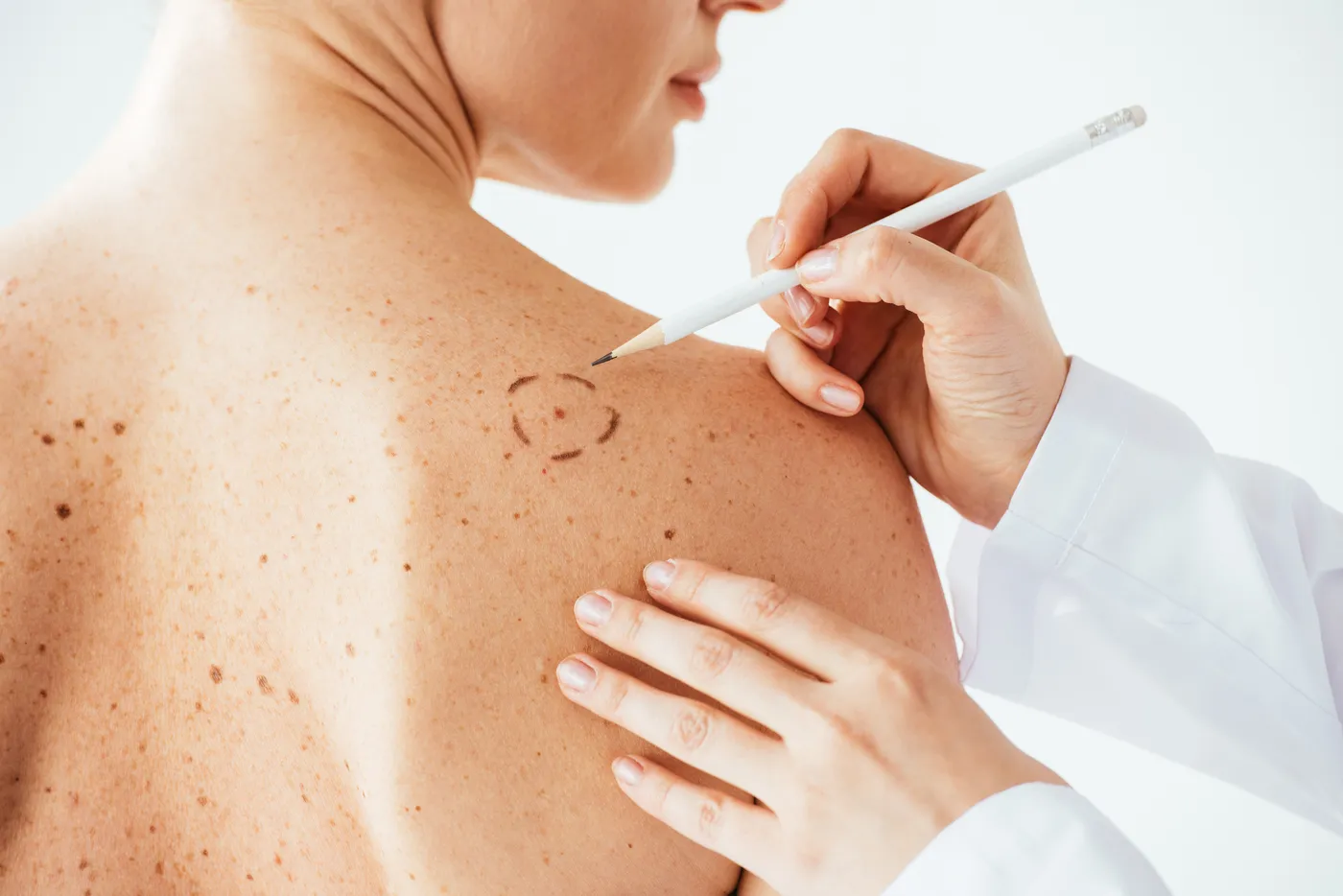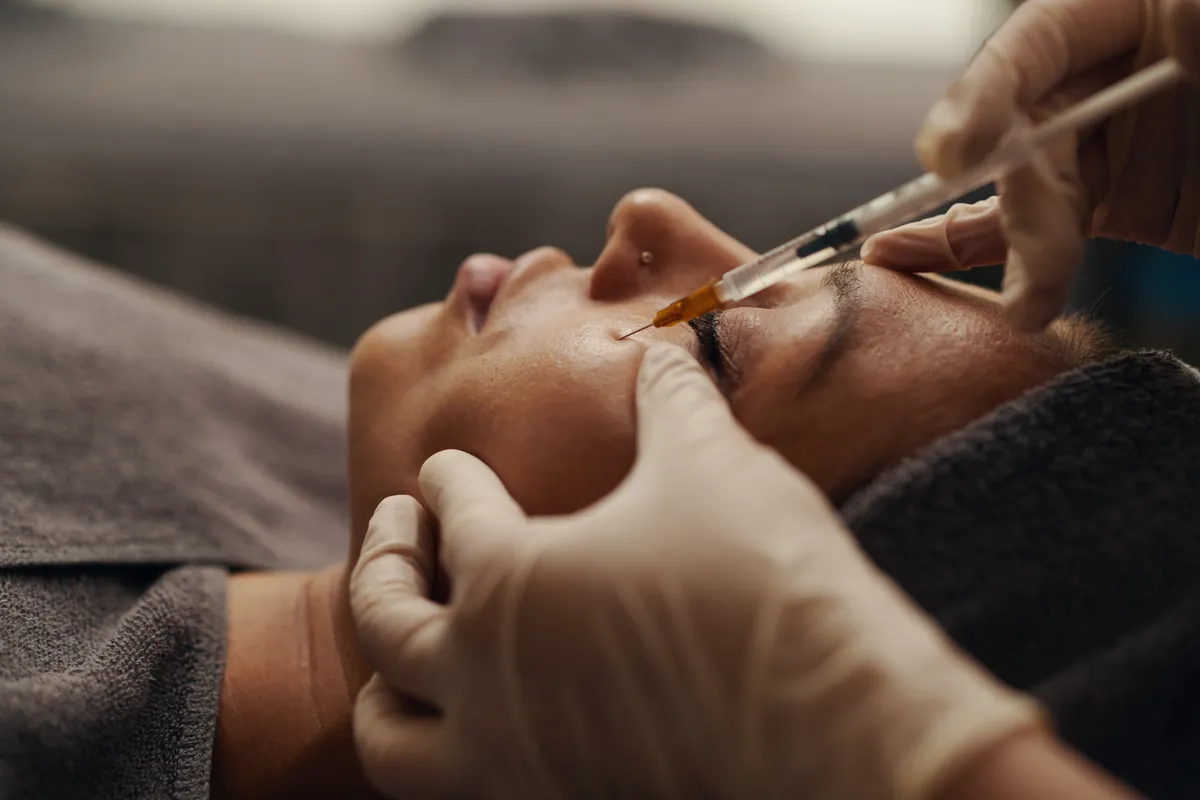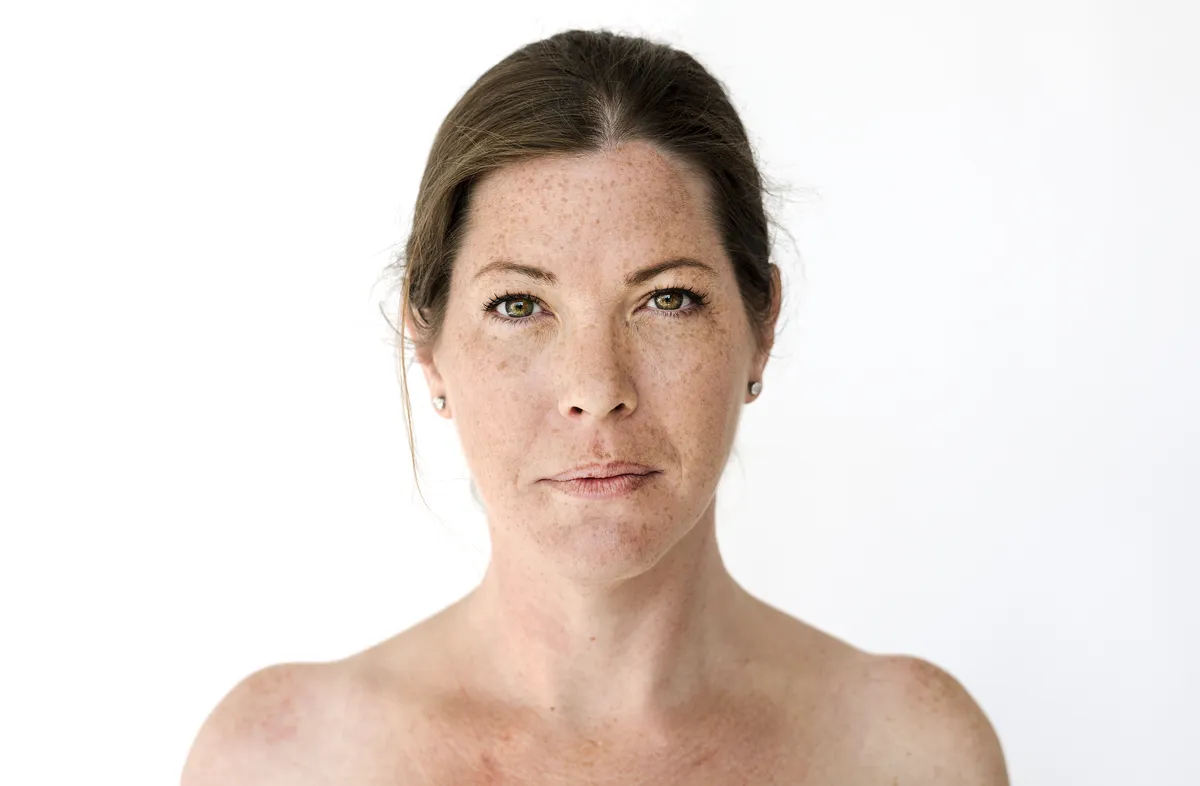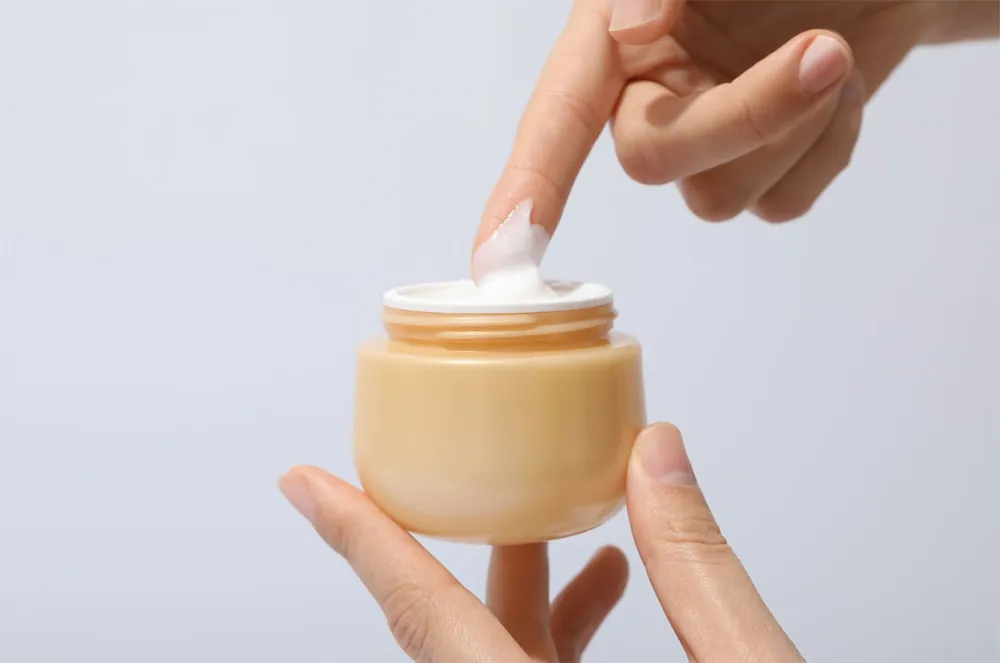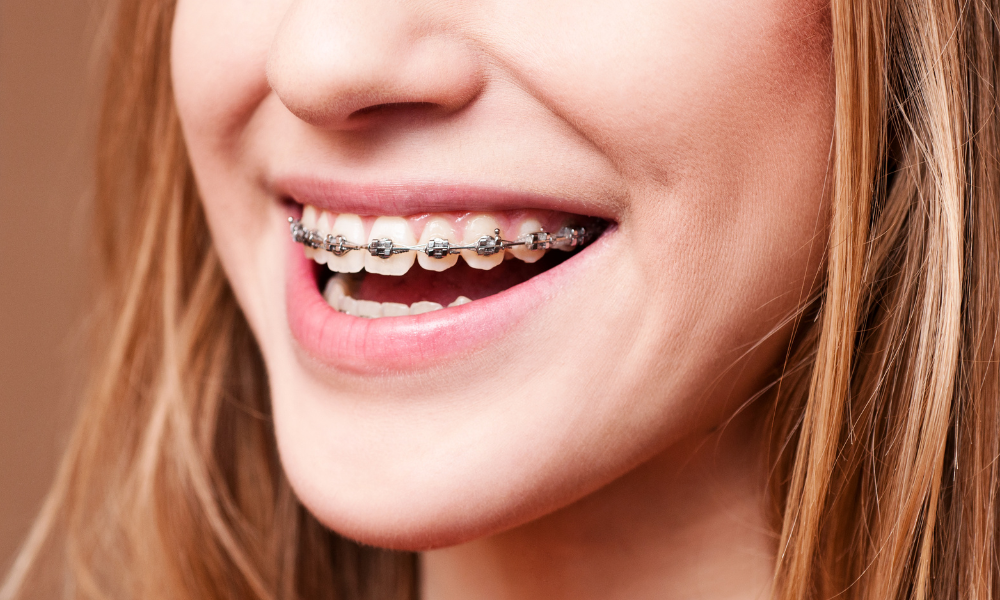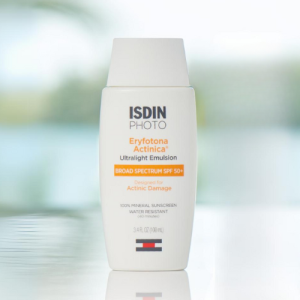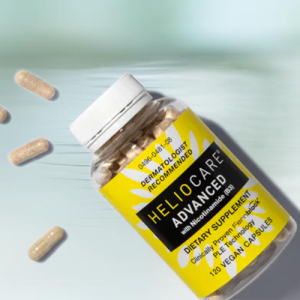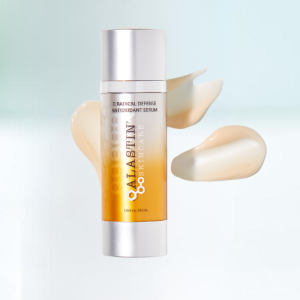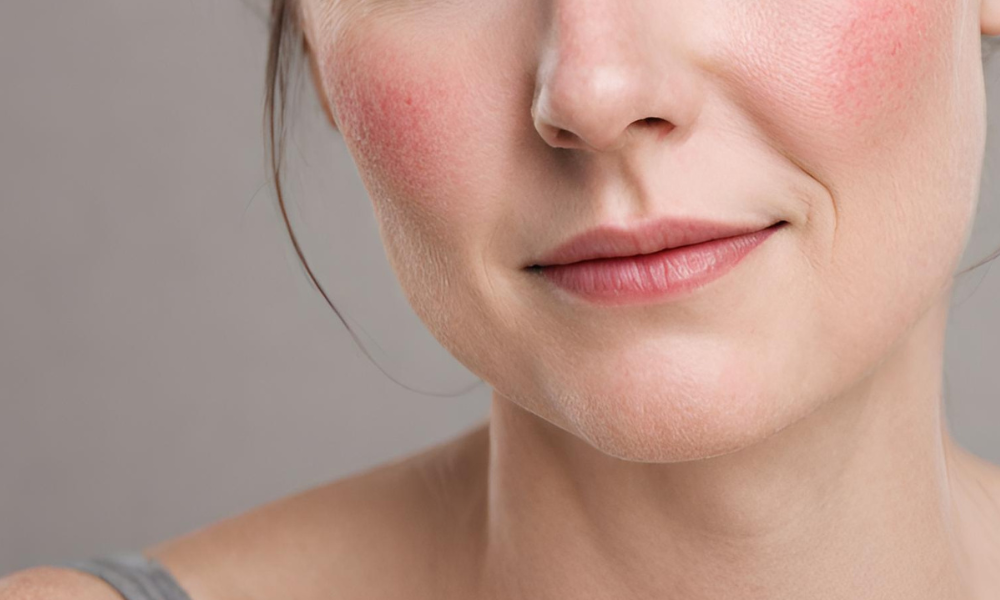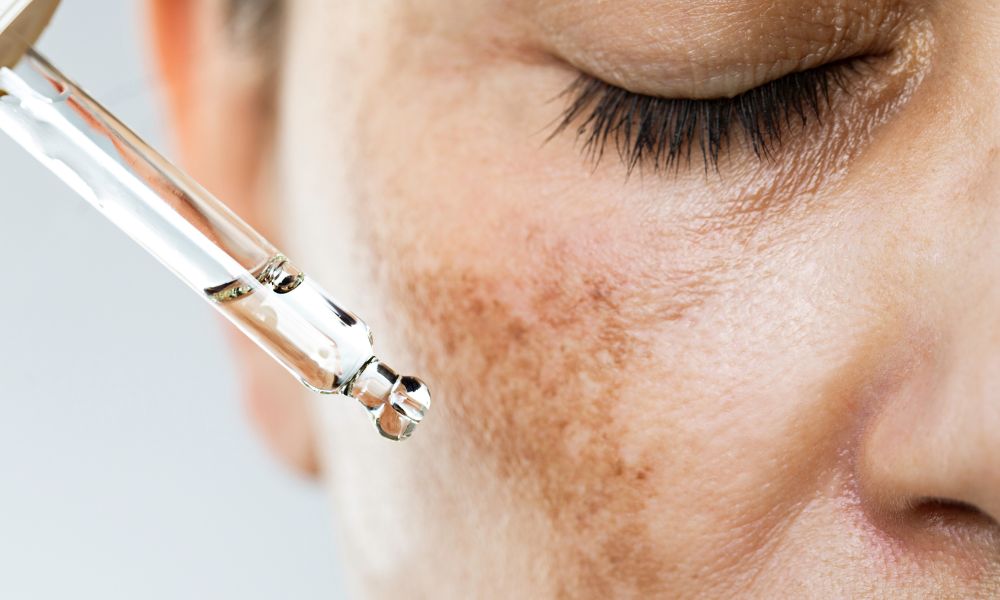Mole Removal 101: How to Know When It’s Time to See a Dermatologist
Moles are a common part of our skin, appearing as small, pigmented spots that most people develop over time. While the majority of moles are harmless, some changes—such as shifts in size, color, or texture—can indicate a need for professional evaluation. Knowing when to monitor a mole and when to seek a dermatologist’s advice is key to maintaining skin health.
In this guide, we’ll walk you through the signs that a mole may need removal, the difference between cosmetic and medical mole removal, and what to expect if you decide to have a mole checked by a dermatologist.
What Are Moles and Why Do They Appear?
Moles are small clusters of pigmented skin cells that develop on the skin’s surface. They can vary in color, shape, and size—ranging from light brown to dark black, flat or raised, and smooth or rough in texture. While some moles are present at birth, most develop over time due to a combination of genetic and environmental factors.
Below are a few factors that contribute to mole formation:
- Genetics: Moles often run in families, meaning if your relatives have many moles, you may too.
- Sun Exposure: UV radiation can trigger the development of new moles and darken existing ones.
- Hormonal Changes: Periods of hormonal fluctuation—such as puberty, pregnancy, or menopause—can cause moles to appear or change in appearance.
While most moles remain stable throughout life, it’s important to monitor any new or changing moles. Sudden changes in size, color, or shape may signal the need for a professional evaluation to ensure your skin stays healthy.
Signs That a Mole May Need Removal
Most moles are harmless, but certain changes can indicate a need for professional evaluation. One of the easiest ways to assess whether a mole may require removal is by using the ABCDE Rule:
- Asymmetry – One half of the mole doesn’t match the other.
- Border – The edges are irregular, ragged, or blurred.
- Color – The mole has multiple colors or uneven shading.
- Diameter – Larger than 6mm (about the size of a pencil eraser).
- Evolving – Any noticeable change in size, shape, color, or texture.
Beyond the ABCDE Rule, other signs may indicate that a mole should be evaluated by a dermatologist:
- Itching, bleeding, or crusting – A mole that becomes irritated, scabs over, or bleeds without injury should be checked.
- Rapid growth or sudden changes – A mole that appears quickly or starts changing rapidly is a red flag.
- Problematic location – Moles in areas prone to constant friction or irritation, such as under bra straps, waistbands, or on the scalp, may be candidates for removal, even if they are benign.
If you notice any of these signs, it’s best to schedule an appointment with a dermatologist. Early evaluation can help determine whether removal is necessary for health, comfort, or peace of mind.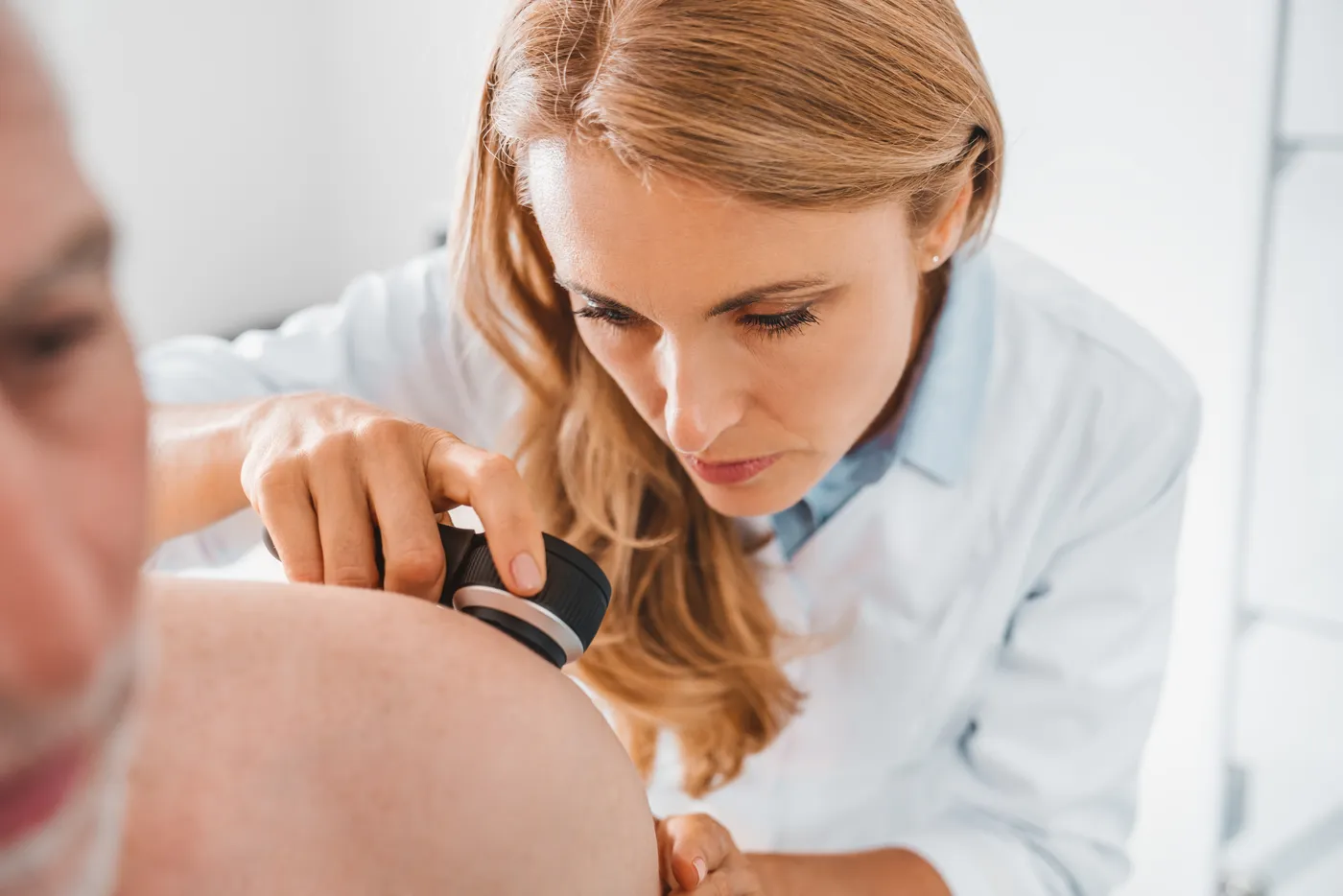
What to Expect During a Mole Removal Procedure
If a dermatologist determines that a mole should be removed—whether for medical or cosmetic reasons—the procedure is typically quick, minimally invasive, and performed in-office.
Depending on the mole’s size, depth, and location, a dermatologist may recommend one of the following removal methods:
- Shave Excision – A thin blade is used to carefully shave the mole off at the skin’s surface. This method is commonly used for small, raised moles and requires little to no downtime.
- Surgical Excision – The entire mole is cut out along with a small margin of surrounding skin, then stitched closed. This method is typically used for deeper moles or those requiring biopsy.
- Laser Removal – For certain cosmetic cases, a laser can be used to break down pigment and remove the mole without cutting the skin. However, this option is not suitable for moles that may be cancerous.
Is Mole Removal Painful?
Most mole removal procedures are done with local anesthesia, meaning you won’t feel pain during the process. Afterward, mild discomfort, redness, or swelling is common but usually resolves within a few days.
Will It Leave a Scar?
Any skin procedure carries a small risk of scarring, but dermatologists take careful steps to minimize scarring. Proper aftercare—like keeping the area clean, avoiding sun exposure, and following your provider’s instructions—can help promote smooth healing.
How Long Is the Recovery?
Downtime is minimal, and most people can return to normal activities the same day. Stitches (if used) are usually removed within one to two weeks, and the area will continue to heal over the next few weeks.
If you’re considering mole removal, a consultation with Pure Dermatology can help determine the best approach for your needs.
When to Schedule a Dermatology Appointment
Regular skin checks are an essential part of maintaining skin health, especially for individuals with a history of significant sun exposure or a family history of skin cancer. While most moles are harmless, it’s always best to have a professional evaluate any mole that looks unusual or has changed over time.
Early detection is key—catching potential concerns sooner rather than later can make a significant difference in treatment outcomes. Even if a mole turns out to be benign, having a dermatologist assess it can provide peace of mind and ensure that your skin remains healthy.
If you’ve noticed a mole that looks different or is causing discomfort, don’t ignore it—staying proactive with skin health is always the best approach.
Do You Have a Mole That Needs to Be Checked?
As we covered in the article, most moles are harmless, but some may need professional evaluation—especially if they change in size, shape, or color or start causing discomfort. By following the ABCDE rule and staying proactive with skin checks, you can help protect your skin and catch any potential concerns early.
If you have a mole that looks different or is causing irritation, it’s best to have it checked by a dermatologist. Schedule a consultation today to get expert guidance from Dr. Hill and the team at Pure Dermatology.
Your Ultimate Winter Skin Care Guide: Hydration, Protection, and Glow
When the chill of winter sets in, your skin often feels the effects first—tightness, flaking, and that unmistakable dry, itchy sensation. Harsh winds, dry indoor heat, and colder temperatures strip your skin of its natural moisture, leaving it dull and dehydrated. Especially for those of us locals in Denver, the winter months can really do a number on your skin!
With the right winter skin care routine, you can keep your skin hydrated, protected, and glowing all season long. In this guide, we’ll share Pure Dermatology’s expert backed strategies to defend against dryness, lock in moisture, and achieve a radiant, glowing complexion—even during the harshest winter months.
Why is Winter Skin Care Important?
Winter weather isn't just cold—it's downright unforgiving on your skin. The drop in temperature, combined with Denver’s dry, high-altitude air, creates a perfect storm for dehydration.
This is why a specialized winter skin care routine is essential. By focusing on hydration and protection you can maintain your skin’s natural defenses, prevent seasonal dryness, and keep your complexion looking healthy and radiant. Whether you're braving Denver's brisk mountain winds or sitting by a toasty indoor heater, your skin needs year-round care—and winter demands extra attention.
Up next, we’ll show you exactly how to do it with simple, dermatologist-approved strategies for hydration, protection, and glow.
Hydration: Lock in Moisture and Keep It There
If there’s one thing your skin needs to survive dry winter air, it’s hydration. Without it, your skin’s natural moisture barrier becomes compromised, leading to dryness, irritation, and that uncomfortable tight feeling. Unlike other seasons, where a light lotion might do the job, winter calls for a more strategic approach to hydration. The good news? With a few of these tips, you can lock in moisture and keep it there.
Use a Gentle, Hydrating Cleanser
The first step in any effective winter skincare routine is your cleanser. Harsh cleansers that "foam" or promise "oil control" may feel refreshing, but they strip away essential oils, leaving your skin more vulnerable to dryness. Instead, switch to a hydrating cleanser that protects your skin’s barrier while still clearing away dirt and impurities. Look for ingredients like ceramides, glycerin, and aloe vera—all of which help retain moisture.
Expert Tip: Opt for cream-based or oil-based cleansers, as they are naturally more hydrating than foaming cleansers. After cleansing, pat your skin dry (don’t rub!) to avoid unnecessary irritation.
Moisturize Immediately After Cleansing
Cleansing your skin prepares it to absorb moisture—but you have to act fast. Within 60 seconds of cleansing, your skin begins to lose hydration through evaporation. That’s why it’s crucial to apply moisturizer right away. This "damp-skin method" locks in moisture before it escapes.
For best results, use a cream-based moisturizer (thicker than lotion) with hydrating ingredients like hyaluronic acid (to draw water in) and squalane (to mimic natural skin oils). If your skin feels particularly dry, look for products with occlusives like shea butter or petrolatum, which create a moisture-sealing barrier.
Expert Tip: Moisturize while your skin is still slightly damp to trap water molecules and enhance hydration. This small step can make a big difference in how your skin feels throughout the day.
Hydrate from the Inside Out
Hydration isn’t just about what you put on your skin—it’s also about what you put in your body! Drinking plenty of water throughout the day helps balance your body’s overall moisture levels, which reflects on your skin. But hydration from food can be just as effective. Water-rich foods like cucumbers, watermelon, and citrus fruits deliver hydration straight to your cells.
In addition to hydration, omega-3 fatty acids (found in salmon, walnuts, and chia seeds) can strengthen the skin barrier and reduce moisture loss—perfect for combating Denver’s dry, high-altitude air.
Protection: Defend Your Skin From Harsh Winter Elements
Once you’ve locked in moisture, it’s time to think about protection. Even the best hydration routine can be undone by harsh winds, UV rays, and dry indoor air. Here’s how to keep your skin barrier strong this winter.

Shield Your Skin From the Elements
When it’s cold and windy, your skin is at risk of losing moisture faster than it can replenish itself. The simplest solution? Cover up. Wearing scarves, gloves, and hats provides a physical barrier against the wind and cold, protecting exposed areas like your face, neck, and hands. These areas are especially vulnerable to dryness and irritation during winter. If possible, choose soft, non-irritating fabrics (like cotton) to avoid friction and sensitivity.
Use SPF—Yes, Even in Winter!
It’s easy to assume that sunscreen is only for summer, but UV rays are present year-round, even on cloudy days. In fact, snow reflects sunlight, increasing UV exposure. Without SPF, your skin is more susceptible to sun damage and premature aging. Use a daily broad-spectrum SPF 30 or higher, especially if you’re out in the sun or around reflective surfaces like snow.
Protect the Skin Barrier
Winter’s dry air weakens your skin's natural moisture barrier, making it less effective at locking in hydration. To protect it, avoid over-exfoliation, which can thin the barrier, and prioritize skincare products with ceramides, squalane, and occlusives (like shea butter) to reinforce it. A strong barrier prevents water loss and keeps irritants out.
By shielding your skin, applying SPF daily, and strengthening the moisture barrier, you can protect your skin from Denver’s harsh winter elements and keep it feeling soft, smooth, and healthy.
Glow: How to Achieve Radiant, Glowing Skin All Winter
Once your skin is hydrated and protected, it’s time to focus on restoring its natural glow. Winter may try to dull your radiance, but with the right care, you can maintain a luminous complexion all winter long!
Exfoliate—But Gently
The buildup of dead skin cells during winter is one of the main reasons skin looks dull. Exfoliation removes these cells, revealing the fresh, healthy skin beneath. But since your skin is more delicate in winter, avoid harsh scrubs. Instead, opt for gentle exfoliants like lactic acid or enzyme-based exfoliators, which dissolve dead cells without damaging your skin's barrier. Stick to exfoliating 1-2 times per week to avoid irritation.
Add a Hyaluronic Acid Serum
If you want a lit-from-within glow, hydration is essential. Enter hyaluronic acid (HA)—a powerhouse humectant that draws moisture into the skin, making it look plump, fresh, and dewy. Apply a few drops of HA serum after cleansing (and after exfoliating, if applicable) while your skin is still slightly damp. Follow up with a moisturizer to "lock in" hydration.
Try a Professional Treatment
Sometimes, at-home care isn’t enough. That’s where in-office clinical facials come in. These treatments are customized to target your unique skin concerns, whether it’s dryness, dullness, or uneven texture. Clinical facials combine deep cleansing, gentle exfoliation, and nourishing hydration to restore your skin’s natural radiance. Winter is also an ideal time for chemical peels, which remove dull surface cells and promote healthy cellular turnover. Both treatments are available at Pure Dermatology to help you achieve a refreshed, glowing complexion this season.
Glow-Boosting Ingredients
To maintain a radiant complexion, seek out products with glow-enhancing ingredients like:
- Vitamin C (brightens and evens skin tone)
- Niacinamide (reduces redness and improves texture)
- Alpha Arbutin (fades dark spots)
With gentle exfoliation, targeted hydration, and powerful ingredients, you can keep your glow intact all winter long.
The Pure Dermatology Team is Here to Help!
Maintaining healthy, glowing skin during Denver’s cold, dry winters requires more than just a good moisturizer—it takes a personalized approach. At Pure Dermatology, our board-certified dermatologists understand the unique challenges that winter weather poses for your skin. That’s why we offer customized care and expert-backed treatments to protect, hydrate, and restore your skin throughout the season.
If you’re ready to give your skin the care it deserves this winter, schedule an appointment with Pure Dermatology. Our team of experts will create a personalized plan to keep your skin feeling soft, smooth, and radiant all season long.
The Art of Cosmetic Injectables: Exploring Botox®, Fillers, and More
Cosmetic injectables have revolutionized the way we enhance beauty and restore confidence. With non-surgical treatments like Botox® and dermal fillers, achieving a refreshed, youthful appearance is easier than ever. These innovative options can provide natural-looking results with minimal downtime, making them a popular choice for those seeking subtle enhancements.
At Pure Dermatology, we specialize in personalized treatments that align with your unique goals. In this article, we’ll explore the art of cosmetic injectables and how they can help you look and feel your best.
What Are Cosmetic Injectables?
Cosmetic injectables are non-surgical treatments that enhance your natural beauty by addressing a range of aesthetic concerns. These minimally invasive procedures use advanced techniques to smooth wrinkles, restore volume, and contour facial features, delivering noticeable yet natural-looking results.
Understanding Cosmetic Injectables
At their core, cosmetic injectables are medical treatments administered via small injections to specific areas of the face or body. They target various concerns such as fine lines, wrinkles, loss of volume, and even fat reduction. Depending on the injectable, they work by either relaxing overactive muscles, boosting collagen production, or adding volume to enhance or reshape certain features.
There are three primary categories of cosmetic injectables:
Neuromodulators: These include popular treatments like Botox® and Dysport®. They work by temporarily relaxing the muscles that cause dynamic wrinkles, such as frown lines, crow’s feet, and forehead creases. The result is smoother skin and a more youthful, refreshed appearance.
Dermal Fillers: These products, such as Juvéderm® or Restylane®, are used to restore lost volume and enhance facial contours. Made of hyaluronic acid or other biocompatible substances, fillers can plump lips, lift cheeks, smooth smile lines, and define the jawline.
Fat-Dissolving Treatments: Kybella® is an example of an injectable specifically designed to target and reduce fat under the chin, helping to create a more sculpted profile.
Benefits and Uses of Cosmetic Injectables
Cosmetic injectables offer a revolutionary approach to enhancing beauty and addressing common aesthetic concerns without surgery. From smoothing wrinkles to restoring volume, these treatments have become a go-to solution for individuals seeking effective yet minimally invasive options.
Injectables go beyond anti-aging benefits—they can also enhance facial symmetry, stimulate collagen production, and provide lasting results. This versatility makes cosmetic injectables an excellent choice for individuals of all ages and aesthetic goals.
Materials Used in Cosmetic Injectables
The effectiveness of cosmetic injectables lies in the advanced materials they use, each tailored to specific concerns and applications. These materials are biocompatible, safe, and FDA-approved to ensure optimal results:
- Hyaluronic Acid (HA): Found naturally in the skin, HA retains moisture, making it ideal for fillers like JUVÉDERM® and Restylane®. It provides hydration, volume restoration, and immediate, natural-looking results.
- Calcium Hydroxylapatite (CaHA): Used in products like Radiesse®, this material adds structure and stimulates collagen production, making it effective for deeper wrinkles and volume loss.
- Poly-L-Lactic Acid: A biodegradable material found in Sculptra® Aesthetic, it works by stimulating collagen over time for gradual, long-lasting rejuvenation.
- Polymethylmethacrylate (PMMA): Known for its durability, PMMA is a semi-permanent option often used to treat deep wrinkles and scars.
- Autologous Fat Injections: This method uses the patient’s own fat to restore volume naturally. While more invasive, it provides long-lasting, customizable results.
Understanding the materials used in injectables helps patients make informed decisions about the treatments best suited for their goals.
What to Expect During Treatment
Receiving cosmetic injectables is a quick and straightforward process that fits seamlessly into your routine. The journey begins with a consultation to discuss your aesthetic goals and develop a customized treatment plan.
During the procedure, a provider may apply a topical anesthetic for comfort. Injections are administered with precision, taking less than an hour in most cases. Some mild redness or swelling is normal post-treatment, but these effects typically subside within a few days. Results vary by injectable type—while fillers offer immediate improvements, neurotoxins like Botox® take a few days to show full effects.
Your provider will also give aftercare recommendations, such as avoiding excessive sun exposure or strenuous activity for the first 24 hours, to ensure optimal results.
Side Effects and Safety
While cosmetic injectables are generally safe, it’s essential to be aware of potential side effects and take precautions to minimize risks.
Common Side Effects:
- Mild bruising, swelling, or redness at the injection site.
- Temporary tenderness or sensitivity in the treated area.
Rare Complications
- Vascular occlusion, which can block blood flow if injections are not placed correctly.
- Allergic reactions or infections, though rare, can occur if safety protocols are not followed.
Choosing a qualified, experienced provider is the most effective way to reduce risks and ensure safe, successful outcomes. At Pure Dermatology, our team adheres to the highest safety standards, using FDA-approved products and advanced techniques for every treatment.
Longevity of Results
The duration of results varies depending on the type of injectable. Neurotoxins like Botox® last 3 to 4 months, while dermal fillers can last 6 to 18 months based on the product and treatment area. Collagen stimulators like Sculptra® provide effects that can last up to 2 years, while Kybella® offers permanent fat reduction once the desired results are achieved.
To maintain results, follow-up treatments can be scheduled based on your aesthetic goals and the recommendations of your provider.
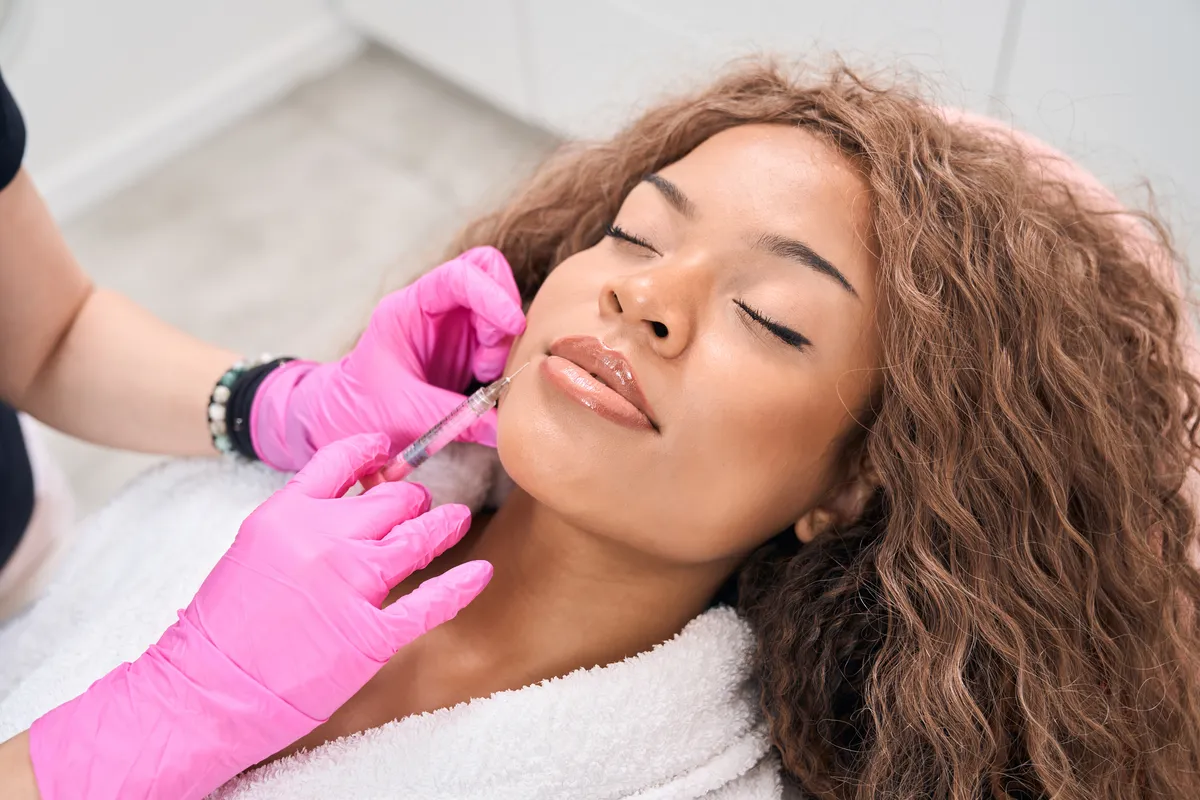
Choosing the Right Provider
Selecting the right provider is crucial to achieving safe, natural-looking results. Look for professionals with extensive experience in facial anatomy and advanced injection techniques. At Pure Dermatology, our team is committed to delivering personalized care and exceptional outcomes, ensuring you feel confident every step of the way.
Cosmetic injectables provide a non-surgical, effective way to enhance beauty, restore confidence, and achieve your aesthetic goals. From smoothing wrinkles to contouring facial features, these treatments are tailored to your needs, offering minimal downtime and maximum results.
At Pure Dermatology, we combine expertise with state-of-the-art techniques to help you look and feel your best. Schedule your consultation today and take the first step toward a refreshed, radiant you.
Skin Discoloration Explained: The Difference Between Melasma and Sun Spots
Noticing a new patch or spot on your skin can leave you wondering: Is it just a sun spot, or could it be something more, like melasma? Both conditions are common forms of skin discoloration, but they develop for different reasons and require different approaches to care. Whether it's hormonal changes or sun exposure to blame, understanding the differences between melasma and sun spots is the first step toward finding the right solution.
In this article, we’ll break down what sets these two types of discoloration apart, how they show up on your skin, and what you can do to prevent and treat them.
What is Melasma?
Melasma is a chronic skin condition that causes brown or grayish-brown patches, usually on the face. It’s common on the forehead, cheeks, upper lip, and sometimes forearms. Known as the "pregnancy mask," melasma often appears due to hormonal changes during pregnancy or from birth control use.
What Causes Melasma?
The exact cause of melasma isn’t fully understood, but common factors include:
- Hormonal changes (pregnancy, birth control, menopause)
- Sun exposure triggering excess melanin production
- Genetics – it’s more likely if others in your family have it
Triggers to Watch For
Certain things can make melasma worse, such as:
- UV rays – even minimal sun exposure can darken patches
- Heat – warm weather or saunas may intensify symptoms
- Hormonal shifts – pregnancy, menopause, or hormone therapy
Though melasma isn’t harmful, it can be persistent. Proper sun protection and professional treatment can help manage it effectively.
What are Sun Spots?
Sun spots, also called age spots or liver spots, are flat, brown spots that develop from prolonged exposure to ultraviolet (UV) light. Unlike melasma, sun spots are directly caused by cumulative sun exposure over time, including tanning beds. They’re especially common in areas that receive the most sun, like the face, hands, shoulders, arms, and back.

What Causes Sun Spots?
Sun spots form after years of exposure to UV rays, which cause melanin (the pigment responsible for skin color) to build up in certain areas. The most common causes include:
- Cumulative sun exposure from outdoor activities or sunbathing
- Use of tanning beds, which accelerate UV damage
When Do Sun Spots Appear?
Sun spots typically start showing up later in life, usually in your 30s or 40s, though they may appear earlier with frequent sun exposure. While they aren’t dangerous, many people seek treatments to reduce their appearance for cosmetic reasons.
Differences Between Melasma and Sun Spots
Though melasma and sun spots both cause discoloration, they differ in appearance, causes, and how they respond to treatment. Knowing these distinctions can help you identify the issue and find the most effective solution.
Color and Shape
Melasma appears as irregular, patchy areas with grayish or brown tones that blend into the skin. In contrast, sun spots are round, flat, and darker brown, making them more distinct.
Location on the Skin
Melasma typically forms on the forehead, cheeks, upper lip, and sometimes on the forearms. Sun spots, however, show up on areas frequently exposed to the sun, such as the hands, shoulders, and back.
Persistence and Treatment
Melasma tends to be more challenging to treat, often returning even after fading. It requires a combination of lifestyle changes and professional treatments to manage. Sun spots, on the other hand, respond well to treatments like laser therapy or chemical peels and are less likely to reappear once treated.
Treatment Options for Melasma
Treating melasma requires a multi-faceted approach, as the condition can be persistent and prone to returning. While no single solution works for everyone, a combination of topical treatments, cosmetic procedures, and lifestyle changes can help manage symptoms effectively.
Topical Treatments
At Pure Dermatology, we often recommend topical creams to lighten melasma patches over time. Common options include hydroquinone, tretinoin with corticosteroids, and azelaic acid or kojic acid, which work to reduce pigmentation gradually.
Cosmetic Procedures
For more stubborn cases, cosmetic treatments can be effective, but they should always be performed under the supervision of a dermatologist. Chemical peels can help exfoliate the skin and promote even tone, while laser therapies like Fraxel can target deep pigmentation. However, caution is needed—some lasers may worsen pigmentation if not used correctly.
Lifestyle Changes
Daily habits play a crucial role in managing melasma. Wearing a broad-spectrum SPF sunscreen every day, even when it’s cloudy, is essential to prevent flare-ups. Incorporating sun-protective clothing, like wide-brimmed hats and sunglasses, can further reduce exposure. Avoiding heat, including saunas and hot yoga, can also help minimize symptoms.
By combining these treatments and preventive strategies, many people see significant improvement in their skin’s appearance. Regular check-ins with a dermatologist ensure the best results over time.
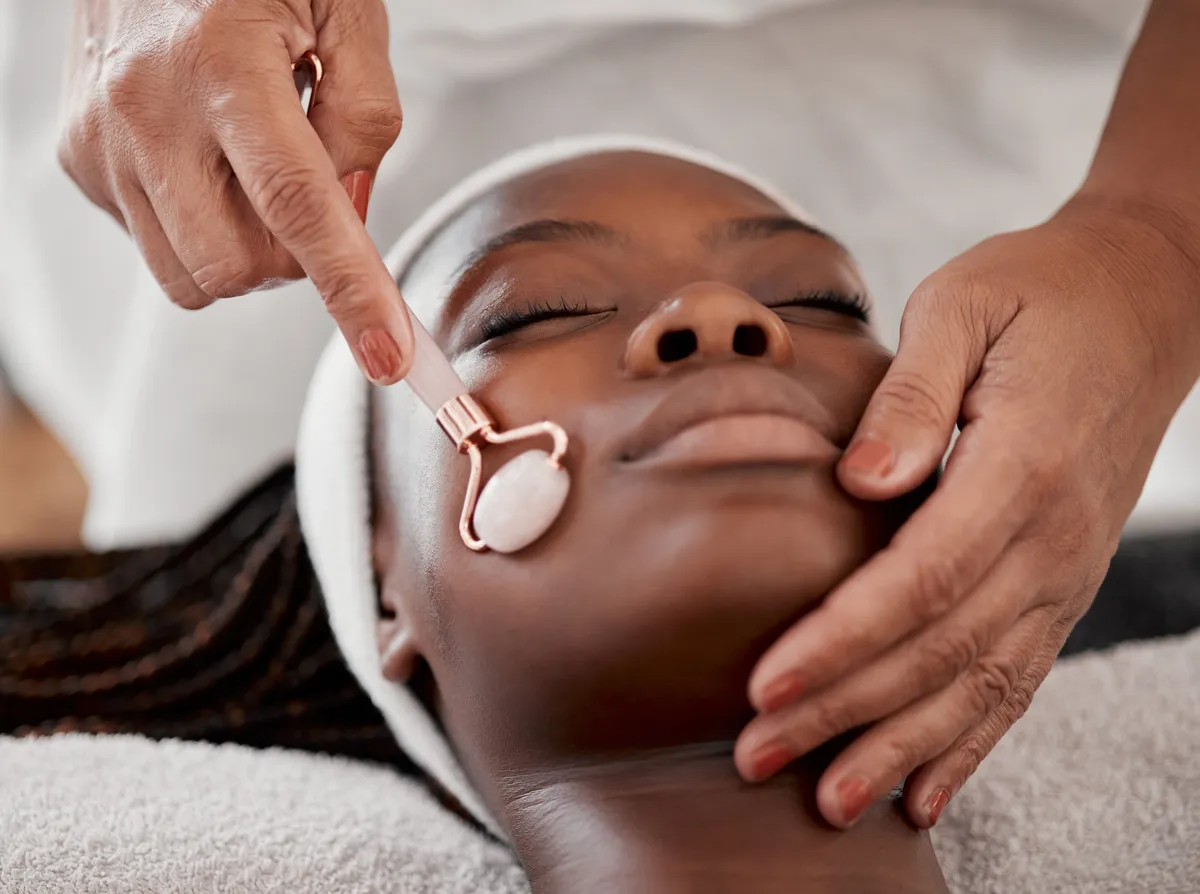
Treatment Options for Sun Spots
Sun spots, though harmless, can be a cosmetic concern for many people. Fortunately, several treatments are available to lighten or remove these spots, ranging from topical solutions to in-office procedures.
Topical Treatments
Topical products can help fade sun spots gradually over time. Retinoids speed up cell turnover, promoting new, even-toned skin. Vitamin C serums are another popular choice, helping to brighten the skin and reduce pigmentation.
Cosmetic Procedures
For more immediate results, dermatologists may recommend cosmetic procedures. Laser treatments, such as IPL or Fraxel, can target pigmented areas, breaking down melanin. Cryotherapy uses freezing to remove stubborn spots, while chemical peels exfoliate the skin, encouraging new, healthier skin to surface.
At-Home Options
For those who prefer at-home care, brightening serums and over-the-counter exfoliants can help reduce the appearance of sun spots. While results may take longer, a consistent skincare routine can lead to gradual improvement.
Whether you opt for topical products, cosmetic treatments, or at-home care, consistency is key. Consulting with a dermatologist will ensure you choose the best approach for your skin type and goals.

Prevention Strategies for Both Conditions
While melasma and sun spots develop for different reasons, prevention plays a key role in managing both. Protecting your skin from UV exposure and incorporating smart skincare habits can reduce the likelihood of new discoloration appearing.
How to Prevent Melasma
Melasma is particularly sensitive to both sunlight and heat, making daily protection essential.
- Limit sun exposure, especially during peak UV hours (10 a.m. to 4 p.m.).
- Use mineral-based sunscreen containing zinc oxide or titanium dioxide, as these ingredients offer broad-spectrum protection.
- Wear physical blockers like wide-brimmed hats and sunglasses to shield your skin from direct sunlight.
- Stay cool by avoiding heat triggers such as saunas and hot yoga, which can aggravate melasma.
How to Prevent Sun Spots
Since sun spots result from cumulative UV exposure, protecting your skin daily can prevent them from forming.
- Apply sunscreen every day, even when it’s cloudy or during winter.
- Avoid tanning beds, which accelerate UV damage and lead to sun spots.
- Incorporate antioxidants like vitamin C into your skincare routine to neutralize free radicals and protect your skin from sun damage.
Developing these habits can make a noticeable difference over time, helping you maintain a clear, even complexion. Pure Dermatology offers a range of SPF products and antioxidants to support your prevention efforts—explore the shop to find the right solutions for your skin.
When to See a Dermatologist and How Pure Dermatology Can Help
If you notice sudden dark patches or if your discoloration worsens despite using sunscreen, it may be time to consult with a dermatologist. Professional care ensures that you receive an accurate diagnosis and explore the most effective treatment options for your skin type.
At Pure Dermatology, our team specializes in diagnosing and treating skin discoloration, including melasma and sun spots. We offer a range of treatments—from chemical peels to laser therapy—and create customized skincare routines to help you achieve lasting results. Whether you need guidance on managing melasma or solutions to fade sun spots, we’re here to help you regain confidence in your skin.
Book a consultation today and take the first step toward a clearer, more even complexion
HydraFacial vs. SilkPeel®: Which Treatment is Best For You?
When it comes to achieving radiant, flawless skin, both HydraFacial and SilkPeel® Dermalinfusion offer powerful solutions. These advanced treatments are designed to bring out your skin's natural glow, but with so many options available, choosing the right one can feel overwhelming.
In this article, we’ll explore both treatments, how they work, and which might be the best fit for you to unlock your healthiest, most radiant skin.
- What is a Hydrafacial?
- Benefits of Hydrafacial
- What is a Silk Peel Treatment?
- Benefits of SilkPeel® Dermalinfusion
- HydraFacial vs. SilkPeel® Dermalinfusion Treatment: Which is Best For You?
- Glow with Confidence: Book Your SilkPeel® Treatment Today
What is a Hydrafacial?
Hydrafacial is a clinically proven, patented skincare treatment which improves the appearance of all different skin types. Unlike traditional facials that may use manual extractions or abrasive exfoliants, Hydrafacial uses a unique, patented device to gently but effectively treat your skin at every step.
Hydrafacial boasts a clear competitive edge thanks to its cutting-edge Vortex-Fusion system, capable of producing noticeably smoother, brighter skin. Imagine simultaneous purification and nourishment – that's exactly what this technology offers, eradicating dead skin cells, oil, and debris while feeding your skin with a rich serum stream. With a deep cleanse that doesn't stop at surface level, your skin gets to drink in the hydration and nourishment it's thirsty for, minus the downsides like redness or days spent indoors. Clear the slate and start anew – and that's exactly what your skin gets when it's pampered with a little TLC, emerging smoother, plumper, and positively glowing.
What Hydrafacial does exceptionally well is offer personalized solutions that focus on your specific skin issues. Whether you're dealing with acne, hyperpigmentation, fine lines, or simply want to brighten dull skin, your treatment can be tailored with specific boosters and serums to address your unique skincare concerns.
Benefits of Hydrafacial
Now that we have a better understanding of what a Hydrafacial is, let’s dive into how it can help you bring out your confidence and most vibrant beautiful skin!
Deep Cleansing and Exfoliation
You can expect a gentle cleanse, removing impurities, excess oil, and dead skin cells that clog pores. Using its patented Vortex-Fusion technology, it effectively exfoliates the skin without the need for abrasive scrubbing. Breakouts don't stand a chance against this thorough cleansing process, which swoops in to rescue skin from imperfections, revealing a fresher, more radiant you.
Hydration and Nourishment
One of the key aspects that sets Hydrafacial apart is the infusion of hydrating serums packed with antioxidants, peptides, and hyaluronic acid. Ingredients packed with goodness permeate the skin, injecting hydration and bolstering its natural protective shield against the elements. Skin that's pampered to perfection looks and feels amazing, like a refreshing drink of water on a parched face.
Brightening and Smoothing
If your skin is looking dull or uneven, this procedure can help restore its natural glow. By balancing exfoliation with infusions of brightening serums to wake up your natural glow. Imagine skin that's smooth, even-toned, and lit from within - that's what you can expect from this effective treatment.
Non-Invasive and Quick
Unlike many other facials or treatments that require downtime, Hydrafacial is non-invasive and entirely painless. Imagine you could reboot your skin in just half an hour - that's exactly what you get with this rapid refresh treatment, perfect for a busy lifestyle. You can even get a Hydrafacial during a lunch break and return to your day with no redness or irritation.
Customizable for Skin Concerns
One of the most valuable aspects of Hydrafacial is its ability to address a wide range of skin concerns. If troubled skin is getting you down, here's the good news: this treatment adjusts to your needs with potent add-ins and serums to smooth out acne, dryness, and other common skin complaints. What makes our approach so effective is that we care for your skin on a highly personal level, crafting each session to meet its unique – wait, no, let's say specific demands.

What is a Silk Peel Treatment?
Silk Peel is an advanced, non-invasive skincare treatment designed to exfoliate, extract impurities, and infuse your skin with nourishing serums, all in one session. Unlike traditional facials, the SilkPeel® Dermalinfusion being used at Pure Dermatology uses a diamond-tipped handpiece to manually exfoliate the outer layer of the skin, removing dead skin cells and debris. This gentle mechanical exfoliation process improves skin texture and tone, revealing brighter, smoother skin instantly.
The unique aspect of a silk peel is its ability to simultaneously deliver customized, medical-grade serums tailored to your skin's specific needs. Whether you’re targeting acne, fine lines, hyperpigmentation, or dehydration, the infusion technology ensures that the serums penetrate deep into the skin where they can be most effective. This dual-action process leaves your skin not only exfoliated but also deeply hydrated and rejuvenated.
Silk Peel is safe for all skin types and is commonly used on sensitive areas like the eyes and lips, as well as the face, neck, and hands. With no downtime and immediate results, the SilkPeel® Dermalinfusion offers a solution for those seeking healthier, glowing skin without the discomfort of harsher treatments.
Benefits of SilkPeel® Dermalinfusion
Now that you understand what SilkPeel® Dermalinfusion is, let’s dive into the specific advantages this advanced treatment offers for achieving healthier, more radiant skin.
Precision Exfoliation
SilkPeel® Dermalinfusion features a diamond-tipped wand that exfoliates the skin with precision, removing dead skin cells to reveal a smoother, brighter complexion. This manual exfoliation is effective yet gentle, offering a deep clean that enhances skin clarity.
Serum Infusion for Customized Care
What sets SilkPeel® apart is its ability to infuse medical-grade serums during the exfoliation process. These serums are customized based on your skin’s unique needs, whether you’re seeking hydration, acne treatment, or reduction in pigmentation.
Radiant, Even-Toned Skin
This treatment is especially beneficial for addressing uneven skin tone, rough texture, and hyperpigmentation. By combining exfoliation and serum infusion, SilkPeel® enhances your skin’s luminosity, leaving you with a brighter, smoother complexion after just one session.
Immediate Results with No Downtime
SilkPeel® delivers instant, visible results. Your skin will feel fresh, plump, and hydrated immediately after treatment, with no peeling or redness. It’s the perfect pick-me-up for glowing skin, whether before an event or as part of your regular skincare routine.
Tailored Solutions for Specific Skin Concerns
Whether you’re dealing with acne, fine lines, or dry skin, SilkPeel® Dermalinfusion can be tailored to address your specific concerns. With its customizable serums and diamond-tip technology, the treatment ensures your skin receives the precise care it needs.

HydraFacial vs. SilkPeel® Dermalinfusion Treatment: Which is Best For You?
Both HydraFacial and SilkPeel® Dermalinfusion are advanced skincare treatments that offer impressive results, but choosing the right one depends on your specific skin goals.
HydraFacial
HydraFacial excels at providing a gentle, all-in-one treatment that cleanses, exfoliates, and hydrates. It’s ideal for those looking for quick hydration and a radiant glow with minimal downtime. The Vortex-Fusion technology delivers instant nourishment, making it perfect for sensitive skin or those needing a rapid refresh.
SilkPeel® Dermalinfusion
SilkPeel® Dermalinfusion, on the other hand, focuses more on precision exfoliation with its diamond-tip wand, offering deeper resurfacing for a more targeted treatment. It's especially beneficial for those dealing with acne, hyperpigmentation, or skin texture issues, as it addresses these concerns while delivering customized serums directly into the skin. This makes SilkPeel® a great option for anyone looking for both exfoliation and long-lasting results.
Which to Choose?
While both treatments are excellent, SilkPeel® Dermalinfusion might be the better choice if you’re looking for a deeper exfoliation and more targeted solutions for skin conditions like acne or discoloration. If hydration and a quick glow are your priorities, HydraFacial could be a great fit. At Pure Dermatology, we specialize in SilkPeel® and can guide you in tailoring this treatment to your unique needs for long-term skin health and radiance.
Glow with Confidence: Book Your SilkPeel® Treatment Today
Healthy, glowing skin is just one treatment away. Whether you’re looking to address specific concerns like acne and hyperpigmentation or simply want to boost your skin’s radiance, SilkPeel® Dermalinfusion offers the precision and care your skin deserves. At Pure Dermatology, our experienced team is ready to help you achieve your skincare goals with a personalized SilkPeel® treatment.
Ready to experience the difference? Book your SilkPeel® Dermalinfusion appointment today and start your journey toward more radiant, healthier skin.
The Ultimate Guide to Sensitive Skin Care: Keep Your Skin Calm and Healthy
Caring for sensitive skin can often feel like walking a tightrope. One wrong move—whether it's the wrong product or an overlooked step in your routine—and your skin could react with redness, irritation, or discomfort. For those with sensitive skin, maintaining a calm, healthy complexion requires a thoughtful approach and a little extra care.
In this guide, we’ll explore essential tips and carefully chosen products designed to keep your sensitive skin happy and healthy. Whether you’re struggling with dryness, redness, or just trying to avoid flare-ups, we’ve got you covered with expert advice that will help you navigate the world of sensitive skin care with confidence.
Understanding Sensitive Skin
Sensitive skin is more than just a label—it's a common condition that affects many people, often leading to discomfort and frustration. If you have sensitive skin, you may notice that it reacts more easily to environmental factors, such as cold weather, wind, or pollution. Harsh skincare products, like those containing fragrances, alcohol, or strong acids, can also trigger redness, itching, or stinging sensations. Even stress can exacerbate sensitive skin, leading to flare-ups that are difficult to manage.
Understanding the unique needs of your skin is the first step toward effective care. Sensitive skin is typically characterized by a weakened skin barrier, which means it's less able to protect itself from irritants. This makes it crucial to understand what your skin reacts to and to choose products and treatments that are gentle, soothing, and free from common irritants.
By recognizing the signs of sensitive skin and understanding what triggers your symptoms, you can make informed decisions that help maintain your skin’s health and resilience. Next, we'll explore how to build a skincare routine to keep your sensitive skin calm, nourished, and protected.
Sensitive Skin Care Tip #1: Gentle Cleansing Routine
Cleansing is a fundamental step in any skincare routine, but for those with sensitive skin, it’s essential to approach it with extra care. The wrong cleanser can strip your skin of its natural oils, disrupt its delicate balance, and lead to irritation. That’s why using a gentle, fragrance-free cleanser is crucial to maintaining a calm and healthy complexion.
When choosing a cleanser, look for products that are specifically formulated for sensitive skin. These cleansers should be free from harsh ingredients like sulfates, alcohol, and artificial fragrances, which can aggravate your skin. Instead, opt for mild, hydrating cleansers that soothe and protect your skin barrier.
To cleanse your skin without causing irritation, follow these tips:
- Use lukewarm water: Hot water can strip your skin of its natural moisture, leading to dryness and irritation. Lukewarm water is gentle enough to cleanse without compromising your skin’s barrier.
- Be gentle with your skin: Avoid scrubbing your face with harsh washcloths or exfoliants. Instead, use your fingertips or a soft, clean towel to apply and remove the cleanser.
- Pat your skin dry: After cleansing, gently pat your skin dry with a soft, clean towel. Rubbing can cause friction and exacerbate sensitivity.
Gentle Cleansers for Sensitive Skin:
EltaMD Skincare:
- EltaMD Foaming Facial Cleanser: A gentle, self-foaming cleanser suitable for sensitive skin, formulated with enzymes and amino acids to cleanse without over-drying or irritating the skin.
Avène:
- Avène Gentle Milk Cleanser: Designed for dry and sensitive skin, this cleanser removes impurities while preserving the skin’s moisture balance.
- Avène Cleanance Cleansing Gel: While primarily for oily, acne-prone skin, it is also suitable for sensitive skin types as it's non-irritating and very gentle.
- Avène Tolerance Extremely Gentle Cleanser Lotion: Formulated specifically for very sensitive and easily irritated skin.
Alastin Skincare:
- Alastin Gentle Cleanser: A sulfate-free, gentle cleanser formulated for sensitive skin. It helps remove impurities and makeup without causing irritation.
Incorporating these products into your daily routine will help ensure that your sensitive skin remains balanced, hydrated, and free from irritation. By starting your skincare regimen with a gentle cleansing routine, you lay the foundation for healthier, more resilient skin.
Pure Dermatology carries these trusted brands. Be sure to check our website for the specific products we offer to suit your sensitive skin care needs!
Sensitive Skin Care Tip #2: Moisturizing Essentials
For those with sensitive skin, moisturizing is not just about adding hydration—it's about creating a protective barrier that shields your skin and locks in moisture. A good moisturizer plays a crucial role in keeping sensitive skin calm, smooth, and resilient.
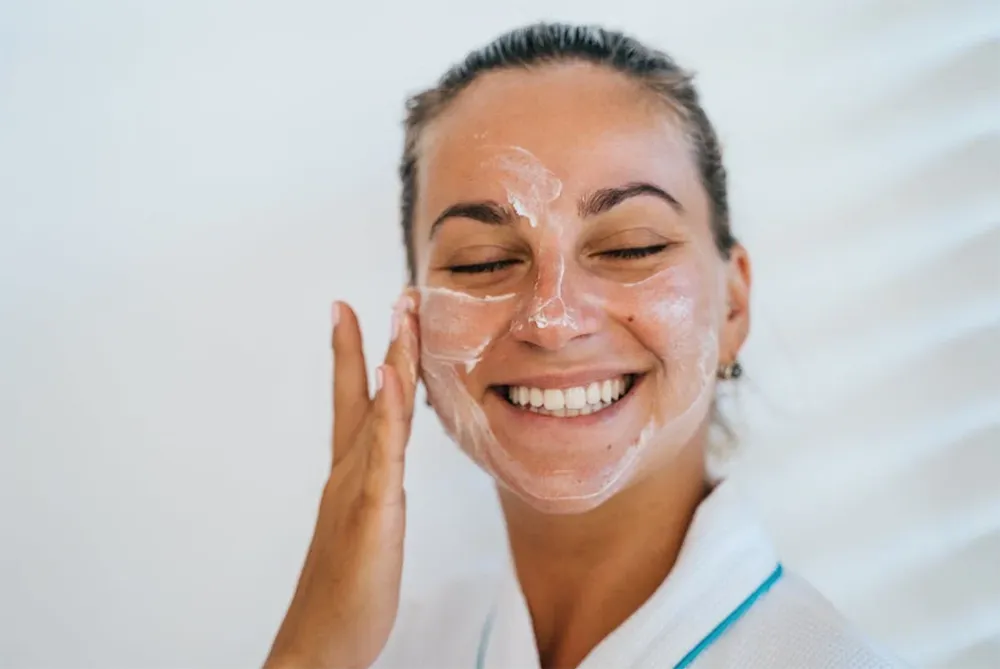
Sensitive skin is more than just a label—it's a common condition that affects many people, often leading to discomfort and frustration. Sensitive skin is a common condition that reacts easily to environmental factors, causing discomfort and frustration. Harsh skincare products, like those containing fragrances, alcohol, or strong acids, can also trigger redness, itching, or stinging sensations. Even stress can exacerbate sensitive skin, leading to flare-ups that are difficult to manage.
Understanding the unique needs of your skin is the first step toward effective care. Sensitive skin is typically characterized by a weakened skin barrier, which means it's less able to protect itself from irritants. This makes it crucial to understand what your skin reacts to and to choose products and treatments that are gentle, soothing, and free from common irritants.
By recognizing the signs of sensitive skin and understanding what triggers your symptoms, you can make informed decisions that help maintain your skin’s health and resilience. In the next sections, we’ll explore how to build a skincare routine that supports your sensitive skin, ensuring it stays calm, nourished, and protected.
- Fragrance-free and hypoallergenic: Fragrances and harsh chemicals can irritate sensitive skin. Choose products labeled as fragrance-free and hypoallergenic to minimize the risk of a reaction.
- Non-comedogenic: Sensitive skin is often prone to breakouts, so opt for a non-comedogenic moisturizer that won’t clog pores.
- Lightweight but effective: A lightweight formula can provide the hydration your skin needs without feeling heavy or greasy.
Sensitive Skin Care Tip #3: Sun Protection
Daily sun protection is a non-negotiable step in any skincare routine and should never be overlooked! Exposure to UV rays can lead to sunburn, premature aging, and even skin cancer, but it can be particularly harsh on sensitive skin, causing redness and irritation. That’s why wearing SPF every day—rain or shine—is crucial to keeping your skin calm and protected.
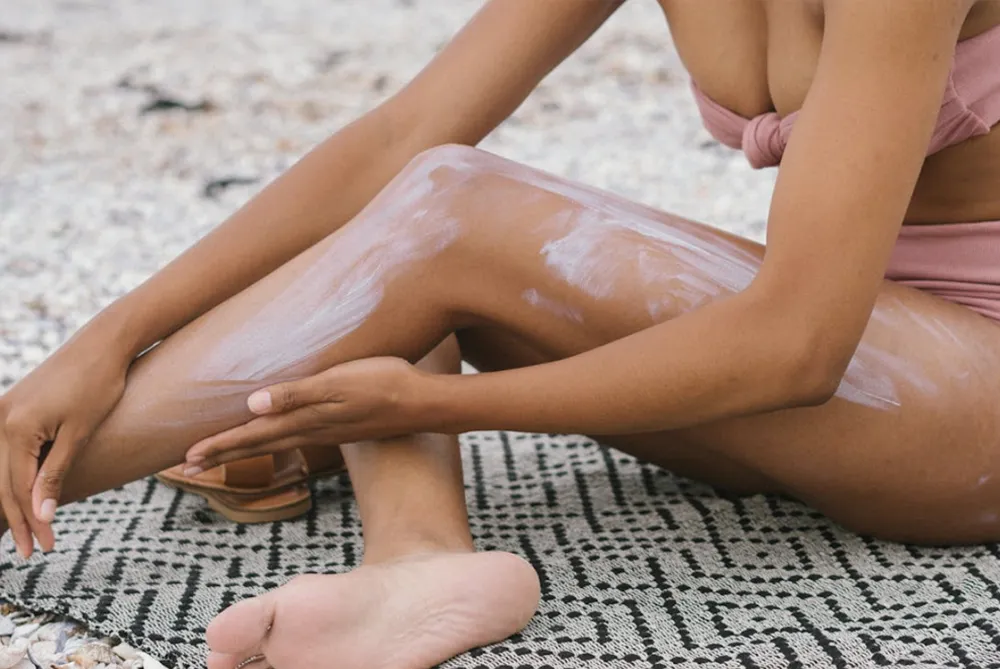
For sensitive skin, mineral-based sunscreens are often the best choice. Unlike chemical sunscreens, which absorb UV rays, mineral sunscreens sit on the skin's surface and physically block them, making them less likely to cause irritation. Look for sunscreens containing zinc oxide or titanium dioxide for gentle yet effective broad-spectrum protection.
Applying sunscreen should be the final step in your morning skincare routine, but reapplying throughout the day is just as important to ensure continuous protection. Here are a few tips on how to reapply sunscreen without disturbing your skin:
- Use a mineral powder sunscreen: This option is perfect for quick touch-ups and won’t leave a greasy residue.
- Carry a travel-sized sunscreen: Opt for a lightweight, non-greasy formula that absorbs quickly for easy reapplication.
- Reapply after sweating or swimming: Sunscreen can wear off with sweat or water exposure.
By making sun protection a daily habit, you can help shield your sensitive skin from harmful UV radiation.
Sensitive Skin Care Tip #4: Choose the Right Products
For sensitive skin, selecting the right products is essential to avoid irritation. Prioritize hypoallergenic, fragrance-free, and alcohol-free options, as these are less likely to trigger reactions. Fragrances and alcohol can be especially harsh, leading to redness and dryness, so it’s best to steer clear of them if you have sensitive skin. For some of our favorite products, check out our blog post “Healthy Skin Is In.”
Also, watch out for common irritants like sulfates, parabens, and harsh exfoliants, which can easily disrupt your skin’s balance. A good rule of thumb is to choose products with simple, minimal ingredient lists—this reduces the chance of introducing something that could irritate your skin.
To minimize irritation, adopt a minimalist skincare routine. Stick to a few essentials: a gentle cleanser, a hydrating moisturizer, and a broad-spectrum sunscreen. Limiting the number of products you use makes it easier to keep your skin calm and identify any triggers that may arise.
When Should You See A Dermatologist?
A well-planned skincare routine can help, but sometimes sensitive skin and reactions can become overwhelming. If you experience persistent redness, irritation, or allergic reactions that don't improve with over-the-counter products, seek professional advice. Conditions like eczema, rosacea, or severe acne can mimic or worsen sensitive skin. Only a dermatologist can provide the accurate diagnosis and treatment needed.
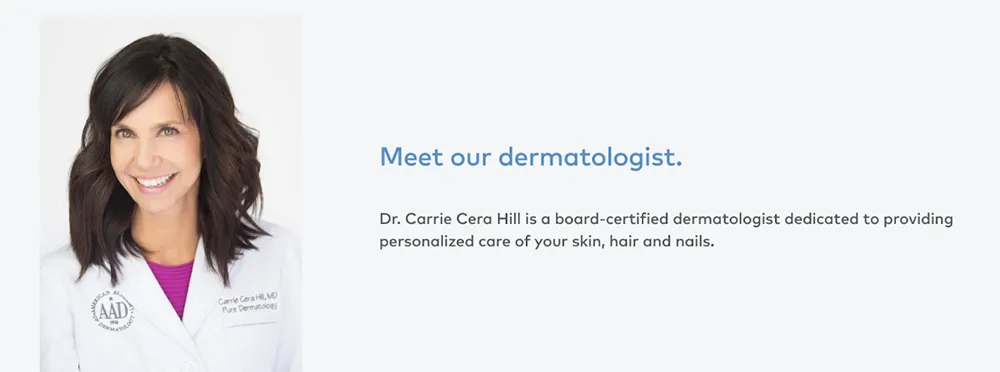
Regular check-ups with Dr. Hill at Pure Dermatology are also important, even if you’re not currently facing major skin concerns. These visits allow Dr. Hill to monitor your skin’s health, adjust your skincare routine as needed, and recommend treatments tailored specifically to your skin type and concerns.
If you’re struggling with ongoing skin issues or simply want expert guidance on caring for your sensitive skin, schedule an appointment with Dr. Hill. At Pure Dermatology, we’re here to provide the personalized care and advice you need to keep your skin healthy and glowing.
Final Thoughts
Caring for sensitive skin requires a gentle and thoughtful approach, ensuring that your skin stays calm and healthy. By being mindful of your products and sticking to a consistent, minimalist routine, you can prevent irritation. Choose products designed for sensitive skin and incorporate daily sun protection to maintain a balanced complexion. Taking these proactive steps helps protect your skin and keeps it healthy.
Remember, your skin’s health is a priority. If you ever need guidance or are dealing with persistent issues, don’t hesitate to seek professional advice. Dr. Hill and the team at Pure Dermatology are here to provide the personalized care and recommendations you need to keep your skin looking and feeling its best.
Does your teen need to see a Dermatologist?
Adolescence is a time of significant physical changes and skin issues often arise.
Summer is the perfect time to schedule a visit with one of our board-certified dermatologists or aestheticians to help with teenage acne and establish proper skincare routines and habits to maintain healthy skin.
- Check out our tips for teenage skin care
- Learn about our clinical facials designed just for teen
- Learn about our new services of eyelash and eyebrow lifting and tinting
- Meet our new aesthetician, Grace Leeper
TIPS FOR TEENAGE SKIN CARE
Wash your face daily.
- Teenagers should be cleansing at least once a day in the shower, but twice daily, both morning and night is ideal.
- Gentle cleansers are a great place to start.
- Some of our favorites: EltaMD Foaming Cleanser, CeraVe Foaming Facial Cleanser, and Cetaphil DermaControl Oil Removing Foam Cleanser.
- For those dealing with acne, benzoyl peroxide or salicylic acid cleansers can exfoliate the skin and prevent clogging of the pores.
Wear a daily moisturizer with sunscreen every morning.
- Teens get a lot of daily sun exposure at school and playing sports. It is important to start wearing daily sunscreen to protect their skin from sun damage.
- There are so many great products that are lightweight and do not feel like sunscreen.
- Some of our favorites: EltaMD UV Clear SPF 46, CeraVe Ultra Light Moisturizing Lotion SPF 30.
Moisturize daily.
- If you have oily or acne-prone skin, you might be inclined to skip moisturizer because you don't want to add more moisture and oil to your skin. However, moisturizing daily is one of the best things you can do for oily or acne-prone skin.
- Daily moisturizing helps prevent dryness and irritation, contributing to clearer skin.
- Some of our favorites: EltaMD Skin Recovery Light Moisturizer, CeraVe PM Facial Moisturizer.
Use non-comedogenic products.
- One of the best tips for teenage skin care is to use non-comedogenic products.
- Non-comedogenic skin care products are specifically formulated not to block pores and do not contribute to the pesky whiteheads or blackheads you're trying to prevent with your skincare routine.
Treat acne early on.
- Teenagers need to address acne proactively.
- Acne is common during puberty due to hormonal changes, however, it won't clear up on its own and can dramatically affect a teen's self-esteem and can also lead to permanent scarring.
- Consult with our team of dermatologists and aestheticians to determine which skin care products are right for your teen's acne.
If you have questions about how to keep your teen's skin healthy, see one of our board-certified dermatologists or licensed aestheticians to develop a game plan that will treat existing concerns and avoid future problems.
TIPS FOR TEENAGE SKIN CARE
Announcing our new services!
Teen Facial:
- We now offer facials just for teens.
- Facials for teens are beneficial for keeping skin clean and preventing future breakouts.
- Our expert aestheticians will provide a targeted 60-minute facial and customized treatment plan to address your teen's specific skin concerns.
- Extractions, calming mask, and LED light OR
- Extractions, salicylic acid, and LED light
Get on the summer schedule to look your best before school starts!
Lash Lift & Tinting:
- Lash lifting is a treatment that uses perming solutions to naturally lift and curl the lashes, making them appear longer and giving your eyes the appearance of being more open and bright.
- Lash tinting is a treatment that makes your natural lashes appear darker and fuller, giving them a similar look as wearing mascara, without having to wear any.
Brow Lamination & Tint:
- Brow lamination is a treatment that uses perming solutions to manipulate the brow hairs to fall into the desired design.
- Brow tinting uses temporary tint to enhance the natural color of the brows, allowing them to appear darker and fuller.
Healthy Skin = Healthier Future
Healthy skin for a healthier future.
May is Skin Cancer Awareness Month. Although skin cancer is one of the most preventable types of cancer, cases are on the rise globally. Discover how we are fighting for healthy skin with awareness and treatments.
See below as we explore:
- Types of Skin Cancer
- Importance of Yearly Skin Exams
- Sun Protection Favorites With Science-Backed Results
TYPES OF SKIN CANCER

Basal Cell Carcinoma
Basal cell carcinoma is the most common form of skin cancer.
- Presents as what appears to be a harmless non-healing pimple, scar, sore, or scaly patch.
- Occurs most commonly in highly sun-exposed areas such as the face, neck, chest, arms, hands, and balding scalp.
- Highly treatable with a very low risk of metastasis of <1%.
- Treatments include Mohs micrographic surgery, excisions, topical chemotherapy and immunotherapy creams, and radiation.

Squamous Cell Carcinoma
Squamous cell carcinoma is the second most common form of skin cancer.
- Presents as a non-healing, red, crusted, or scaling bump or sore.
- Occurs most commonly in the highly sun-exposed areas such as the face, neck, chest, arms, hands, and balding scalp.
- Risk of spreading ranges from 1-10%, if detected early they are easily treated with Mohs surgery, topical treatments, or radiation.

Melanoma
Melanoma is less common but the most serious form of skin cancer.
- Presents as a new or changing mole or brown spot.
- More common on sun-exposed skin but can occur anywhere including the bottom of your feet, eyes, scalp, and other unexposed skin.
- If detected early, melanoma has a 99% cure rate. However, it can become life-threatening by spreading to the lymph nodes and internal organs.
- ABCDEs of melanoma help us detect which brown spots on our skin are concerning.

The first Monday in May is designated as Melanoma Monday by the American Academy of Dermatology. We are joining the cause to raise awareness of skin cancer and encourage you to examine your skin for suspicious spots. It's also important to schedule your annual full-body skin exam. At Pure Dermatology, our expert dermatologists, Dr. Ghiselli, Dr. Cera Hill, and Dr. Farahi, can perform skin exams to screen and detect skin cancer. We offer many options for treatments for skin cancers, including Mohs Micrographic Surgery.
- Mohs surgery is a specialized surgical and microscopic procedure that progressively removes thin layers of cancer-containing skin until the margin is clear of cancer. It allows the removal of as little skin as possible while attaining the highest cure rate. This procedure is performed at Pure Dermatology by board-certified Mohs surgeon, Dr. Samantha Ghiselli.
Schedule A Full Body Skin Check + Screening
SUN PROTECTION FAVORITES WITH SCIENCE-BACKED RESULTS
Living in Colorado we are all exposed to the sun daily and are at risk for skin cancer. Check out our favorite products (all available at Pure Dermatology for 20% off during May) to help protect you from the sun and reduce your risk of skin cancer.
SPF — ISDIN Eryfotona Actinica SPF 50+
- Eryfotona Actinica is more than a sunscreen, it can reverse previous DNA damage from the sun.
- Its innovative formula contains patented DNA Repairsomes®, clinically proven to help repair existing sun damage.
Dietary Supplement — Heliocare
- Heliocare is a dietary supplement that contains a unique extract from a Fernleaf plant called Polypodium leucotomos, which helps your skin protect itself from the free radical DNA damage caused by the sun. In addition to Nicotinamide, a derivative of Vitamin B3, that has been clinically proven to reduce the incidence of precancerous lesions called actinic keratosis by up to 23%.
- We recommend taking it any time you have extended sun exposure, whether on a tropical vacation, golfing, hiking, or watching your child's or grandchild's soccer game.
- Additionally, it is recommended for any patient with a history of precancerous skin lesions or skin cancer.
Vitamin C — Alastin C-RADICAL Defense
- Formulated with a novel form of Vitamin C (Sodium Ascorbate), which helps to defend against free radical damage while supporting the skin's ability to conserve elastin.
- 15 proven antioxidants to help neutralize free radicals, and protect against UV damage and other environmental stressors such as blue light and pollution.
Redness? We Can Help!
April is National Rosacea Awareness Month at Pure Dermatology Denver
14 million Americans have rosacea, a chronic and common skin condition that is characterized by persistent facial redness and flushing along with bumps, pimples, and visible blood vessels. While there is no cure for rosacea, there are many proven treatment options that can relieve symptoms.
See below as we explore:
-
- Facts, types, and triggers of rosacea
- Treatments to minimize rosacea
- Featured rosacea skin care products
- Aesthetician Corner: CYNOSURE® Palomar Icon™ to treat rosacea
IMPORTANT FACTS ABOUT ROSACEA
- Rosacea is genetic: You can inherit a gene that predisposes you and your family members to the condition.
- Rosacea frequently affects people with lighter complexions: Rosacea can affect anybody, regardless of skin tone, however, it is more common in people with lighter complexions.
- Symptoms can worsen: Rosacea symptoms are likely to worsen over time if left untreated.
- Sun exposure: Excessive sun exposure can aggravate rosacea flare-ups.
- Rosacea can affect the eyes: Up to 50% of rosacea cases will have symptoms of redness and itching of the eyes.
Rosacea and acne can become confused
- Acne:
- Primarily characterized by pimples and clogged pores primarily in the T-zone, peripheral face, and jawline area.
- It usually begins at a younger age (between 15 and 25 years).
- Usually limited time with hormonal changes, but can occasionally be chronic.
- Rosacea:
- Primarily characterized by a background of redness with overlying pimples in the central face area of the cheeks and nose.
- Usually occurs after the age of 30.
- Usually chronic and long-lasting, but can be treated and controlled.
Rosacea has Four Subtypes
- Erythematotelangiectatic rosacea - Redness, flushing, and visible blood vessels.
- Papulopustular rosacea - Redness, swelling, and acne-like breakouts.
- Phymatous rosacea - Skin thickens and has a bumpy texture, usually on the nose.
- Ocular rosacea - Eyes are red and inflamed, they may feel dry and irritated.
Rosacea Triggers
- Dry climates
- Extreme hot or cold temperatures
- Excessive exposure to sunlight
- Drinking alcohol
- Eating spicy foods
- Certain ingredients in skin care products (alcohol, urea, fragrance, glycolic acid, sodium laurel sulfate, menthol, lactic acid, camphor, and retinols)
Dermatologist Recommended Treatments for Rosacea
- Prescription oral and topical medications:
- Oral prescription anti-inflammatory medications, such as prescription doxycycline, are effective in papulopustular rosacea and are the gold standard treatment for ocular rosacea.
- Topical prescription anti-inflammatory medications, such as metronidazole and ivermectin, and exfoliating ingredients such as azelaic acid.
- Over-the-counter anti-inflammatory products, including ingredients such as niacinamide.
- Sun protection, daily SPF.
- Surgical debunking of rhinophymatous changes of the nose.
- Laser treatments can provide a significant reduction in redness and diminishment of blood vessels.
PURE DERMATOLOGY PRODUCT PROMOTIONS
Two fantastic medical grade skin care products that are ideal for rosacea prone skin available at Pure Dermatology Denver.
Check out all of our skin care products.
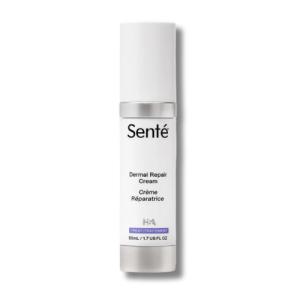
Senté Dermal Repair Cream
What makes Senté’s medical-grade skincare unique is their patented technology, Heparan Sulfate Analog (HSA).
Dermal Repair Cream has been clinically proven to:
 Reduce visible redness and sensitivity after only 4 weeks.
Reduce visible redness and sensitivity after only 4 weeks.
 Deeply hydrate and renew skin.
Deeply hydrate and renew skin.
 Promote healthier, more even-looking skin.
Promote healthier, more even-looking skin.
 Improve the appearance of fine lines and wrinkles.
Improve the appearance of fine lines and wrinkles.
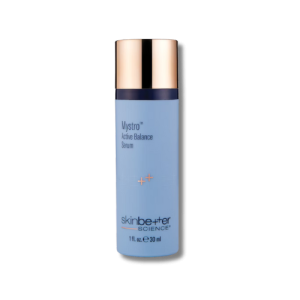
SkinBetter Mystro Active Balance Serum
Mystro Active Balance Serum Improves the appearance of redness, skin texture, dullness, pore size and uneven pigmentation.
Mystro Active Balance Serum has been clinically proven to:
 Improve visible skin quality in just 2 weeks.
Improve visible skin quality in just 2 weeks.
 Significant improvement in the appearance of redness, skin texture, dullness, pore size and uneven pigmentation after 8 weeks of twice-daily use.
Significant improvement in the appearance of redness, skin texture, dullness, pore size and uneven pigmentation after 8 weeks of twice-daily use.
 Helps achieve glowing, healthier-looking skin.
Helps achieve glowing, healthier-looking skin.
 98% of patients said they felt more confident in the appearance of their skin after 12 weeks.
98% of patients said they felt more confident in the appearance of their skin after 12 weeks.
AESTHETICIAN CORNER
CYNOSURE® Palomar Icon™ to treat Rosacea
Laser treatments for rosacea are quick, effective, and easily adjusted to fit your individual skincare needs.
- Reduce the appearance of redness and broken blood vessels.
- Reveal even, smooth skin.
How it works:
Specialized pulses target blood vessels without harming the surrounding skin. The light delivered to your skin causes them to slowly disappear through your body’s natural healing process.
Patients begin to see results after the first treatment, but there is usually a series of three treatments recommended for optimal results. Work with your provider to develop a plan that is right for you!
Schedule a FREE aesthetician consult to see if CYNOSURE® Palomar Icon™ would be a good treatment option to reach your skin care goals.
It's Time to Tackle Brown Spots
Dark or brown spots are one of the most common skin complaints received by dermatologists.
Hyperpigmentation of the skin can be caused by a variety of factors, including:
- Sun damage
- Post-inflammatory changes from acne or other skin conditions that cause inflammation of the skin
- Hormonal and genetic conditions such as melasma
There are many treatments for dark spots, including lasers and peels, topical prescription (Rx) creams, over-the-counter (OTC) topical treatments, and oral vitamin or amino acid supplements. The best results are achieved when multiple treatment types are expertly combined.
Let the Pure Dermatology team of board-certified dermatologists and aesthetician develop a treatment plan and skin care regimen specific to your skin goals!
INGREDIENTS TO LOOK FOR TO FIGHT HYPERPIGMENTATION
Rx Tretinoin or OTC Retinols:
- Increases skin turnover and exfoliation.
- Used in combination with other lightening products can increase penetration.
Glycolic Acid, Alpha Hydroxy and Beta Hydroxy Acids (AHA or BHA):
- Exfoliates the skin.
Azelaid Acid:
- Higher concentrations (15-20%) inhibit free radicals and tyrosinase, which is an enzyme necessary for melanin production.
Kojic Acid:
- Inhibits tyrosinase, which is an enzyme necessary in the production of melanin.
Transexamic Acid:
- Synthetic amino acid that blocks excess melanin production.
- Available topically in OTC products and orally via Rx.
Cysteamine:
- Reduces melanin production by inhibiting key enzymes required in melanin production.
Hydroquinone:
- Decreases and prevents the formation of excess melanin in the skin.
- Available in 1-2% strength in OTC products and 4% or greater with a prescription.
- Works well but cannot be used long term, best used in Rx strength for short time periods and followed with other dark spot correctors for long term maintenance.
Niacinamide:
- Anti-inflammatory that helps barrier function of the skin with increases hydration and improves uneven tone.
Vitamin C:
- Potent antioxidant that helps repair skin and indirectly reduces hyperpigmentation.
Licorice Root Extract:
- Anti-inflammatory by inhibiting pro-inflammatory cytokines.
PATH-3 Technology:
- Unique new patented ingredient that helps to minimize the recurrence of surface pigmentation and protect against future damage.
NEW PRODUCT ALERT!

Isdinceutics Melaclear Advanced
What we love: Dewy serum texture, non-irritating while exfoliating and calming the skin.
Key ingredients:
- Tranexamic acid
- Niacinamide
- Licorice Root Extract
- Blend of exfoliating acids
Browse Our Skin Care Favorites
AESTHETICIAN CORNER
Are you ready to rejuvenate your skin and achieve a more even skin tone and youthful appearance? Now, before the summer, is the perfect time to consider Intense Pulsed Light (IPL) treatments.

What is IPL? IPL stands for Intense Pulsed Light, a technology that uses broad-spectrum light to target various skin concerns. It is commonly used to treat sun damage, brown spots, redness, broken blood vessels and overall uneven skin tone. IPL works by delivering pulses of light energy into the skin which are absorbed by the red and brown pigmentation and brought to the surface and removed.
Are you a good candidate for IPL? IPL is safe for most skin types and can be customized to address individual skin concerns. However, it is important to consult with a qualified skincare professional to determine if IPL is the right treatment for you.
Take the first step towards healthier, more radiant skin by scheduling a consultation to learn more about the benefits of IPL treatments. Say goodbye to skin imperfections and hello to a more confident you with IPL!

